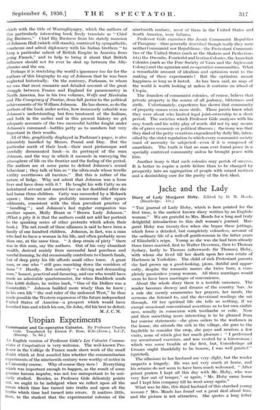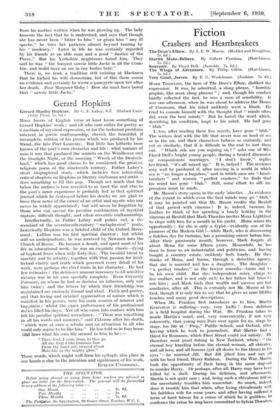Jacke and the Lady
Diary of Lady Margaret Hoby. Edited by D. M. Mends. (Routledge. 15s.) " THE journal of Lady Hoby, which is here printed for the first time, is the earliest known diary written by an English- woman." We are grateful to Mrs. Meads for a long and truly delightful introduction to this dull woman's journal. Mar- garet Hoby was twenty-five when she began these jottings, which form a detailed, but completely colourless, account of the ordinary life of a well-off gentlewoman in the latter years of Elizabeth's reign. Young as she was she had been already three times married, first to Walter Devereux, then to Thomas Sydney, lastly to Thomas (afterwards Sir Thomas) Hoby, with whom she lived till her death upon her own estate of Hackness in Yorkshire. The child of rich Protestant parents she had grown up a good-looking, pious, dutiful and appar- ently, despite the romantic names she twice bore, a com- pletely passionless young woman. All three marriages would seem to have been marriages of convenience.
About the whole diary there is a terrible sameness. The reader becomes drowsy and dreams of the country 'bus. As a rule she merely enumerates her prayers, her meals, the sermons she listened to, and the devotional readings she sat through. Of her spiritual life she tells us nothing, if we except occasional conventional assertions as to her own sinful- ness, usually in connexion with toothache or colic. Now and then something more interesting is to be gleaned from her concise statements—she gives orders to the workmen in the house, she attends the sick in the village, she goes to the hayfields to consider the crop, she pays and receives a few visits, none of which give her much pleasure : "I performed my accustomed exercises, and was vesited by a kinswoman: which was some trouble at the first, but, Consideringe all Crosses ought thankfully to be bourne, I was well guiated " (quieted).
The allusions to her husband are very slight, but the reader ' suspects a tragedy. He was not very much at home, and his returns do not seem to have been much welcomed. 'After privat praiers I kept all this day with Mr. Hoby, who Was very farr out of temper," or again, "Mr. Hoby came home and I kept him company till he went away again."
What was he like, this third husband of this starched young woman ? Mrs. Meads has found out a great deal about him, and the picture is not attractive. She quotes a long letter from his mother written when he was growing up. The lady laments the fact that he is undersized, and says that though she has never been "bitter to him " or given him "any ill speche," he tries her patience almost beyond bearing by his " insolency." Later in life he was certainly regarded by his friends as an able man and a good "Justice of the Peace." But his Yorkshire neighbours hated him. They said he was "the busyest sawcie little Jacke in all the Coun- trie, and wolld have an ore in eny bodies bote."
There is, we read, a tradition still existing at Hackness that he kicked his wife downstairs; but of this there seems no evidence and certainly he wrote a panegyric upon her after her death. Poor Margaret Hoby ! How she must have bored that sawcie little Jacke."































 Previous page
Previous page